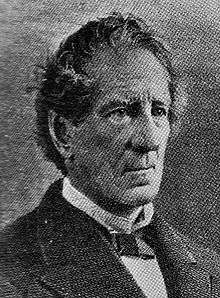Richard Fuller (minister)
Richard Fuller (April 22, 1804 - October 20, 1876) was one of the founders of the Southern Baptist movement.

Biography
| Southern Baptists |
|---|
|
Background |
|
Doctrinal distinctives
|
|
Seminaries |
Born to a respected family in Beaufort, South Carolina, he received his early instruction from Dr. William T. Brautly. At the age of seventeen, Fuller entered Harvard University in Massachusetts. Despite health problems, he graduated with his class in 1824.[1]
He then studied law in Beaufort, was admitted to the bar and soon rose to eminence in his profession. Despite his success, during a period of great religious interest in Beaufort he felt it his duty to abandon the law and devote himself to the Christian ministry. At the same time, he decided to leave the Protestant Episcopal Church in which he had been brought up.[2] He married a wealthy widow whose affairs he attended to as an attorney, and converted to the Baptist Church under the guidance of preacher Daniel Baker.[1]
He was at once ordained, and called to the pastorate of the Baptist church at Beaufort. His reputation as a preacher soon became national and his services were widely sought in promoting religious revivals.[2] In preaching, Fuller closely copied the style of French preacher James Saurin.[1] During his residence in Beaufort, he was engaged in two memorable controversies — one with Bishop England of Charleston, on the claims of the Roman Catholic Church, and the other with President Wayland, of Brown University, on the subject of slavery. In 1836 he traveled in Europe for the benefit of his health.[2]
In 1844, Fuller was one of the founders of the Southern Baptist movement, which split from the Northern Baptists over the issue of slavery in the United States, which Fuller and the Southern Baptists refused to oppose.[1] He was more than once president of the Southern Baptist Convention. In 1846, he became pastor of a Baptist church in Baltimore, Maryland, where he spent the remainder of his life.[2]
Writings
In addition to pamphlets and various sermons published separately, he was the author of a volume of Sermons, Letters on the Roman Chancery, Correspondence on Domestic Slavery, Argument on Baptist and Close Communion (1849), and Psalmist.[2][3]
Further reading
James H. Cuthbert, Life of Richard Fuller (New York, 1879). Cuthbert is his nephew.
Sources
- Henry Mitchell MacCracken, Lives of the leaders of the church universal, from Ignatius to the present time (1880), p. 697-703.
- This article incorporates text from a publication now in the public domain: Rines, George Edwin, ed. (1920). . Encyclopedia Americana.
- Gilman, D. C.; Peck, H. T.; Colby, F. M., eds. (1905). . New International Encyclopedia (1st ed.). New York: Dodd, Mead.
External links
| Wikiquote has quotations related to: Richard Fuller (minister) |
See also
- List of Southern Baptist Convention affiliated people
- Southern Baptist Convention
- Southern Baptist Convention Presidents
| Preceded by R.B.C. Howell |
President of the Southern Baptist Convention
Richard Fuller |
Succeeded by Patrick Hues Mell |